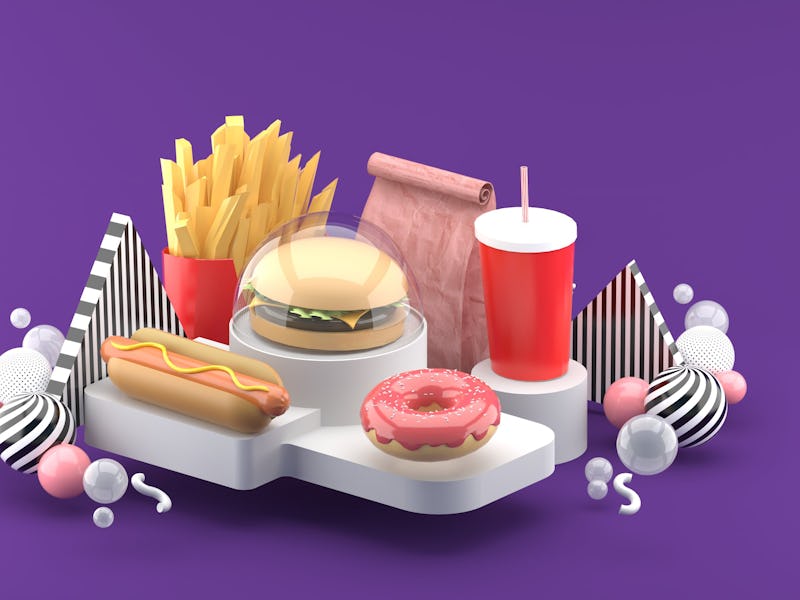One common food type could heighten the risk of death by 26 percent
Food processing "may represent a risk factor for adverse health outcomes."

A century ago, the average American ate mostly fruits, vegetables, whole grains, and some meat. Flash forward to 2020 and this diet is dominated instead by industrially-processed chicken sandwiches, sugar cereals, and ready-made "Lean Cuisines."
Data shows 57 percent of Americans' average calorie intake comes from ultra-processed foods. These foods lack nutrients, are high in chemical additives, oil, sugar, and salt, and account for 90 percent of U.S. added sugar consumption. Americans aren't alone in their habit: The average European derives up to 36 percent of their daily energy from ultra-processed food.
In a startling new study including over 22,000 people, scientists discovered that this trend may be severely heightening the risk of dying prematurely.
In the study, people who ate lots of ultra-processed foods — items like frozen meals, hot dogs, and salty snacks — were 26 percent more likely to die of any cause. They also had double the risk of dying from cardiovascular diseases like heart attacks and stroke.
"Many do believe that paying attention to the nutritional content of food may be sufficient to preserve health," study co-author Marialaura Bonaccio tells Inverse.
"But analyses of ultra-processed foods say that nutritional content is not the only criterion to say whether we are eating healthy or not. Food processing may represent a risk factor for adverse health outcomes itself."
Bonaccio is a researcher at the department of epidemiology and prevention at I.R.C.C.S. Neuromed, a neurological institute in Italy. Her team published their findings Thursday in the American Journal of Clinical Nutrition.
LONGEVITY HACKS is a regular series from Inverse on the science-backed strategies to live better, healthier, and longer without medicine. Get more in our Hacks index.
HOW THIS AFFECTS LONGEVITY — The study included 22,475 men and women living in Italy over the age of 35. Researchers analyzed participants' eating habits and split the group based on their consumption of ultra-processed foods. They also tracked their health conditions for over eight years.
Subsequent analysis revealed consuming a high amount of ultra-processed foods, about 5 to 6 servings per day, was associated with an increased risk of death from any cause by 26 percent.
This group also had a 58 percent higher risk of dying from cardiovascular diseases like heart disease or stroke. The team didn't observe any association with dying from cancer.
WHY IT'S A HACK — Other research suggests ultra-processed foods cause cells to age faster, and are link the foods to the development of hypertension, obesity, metabolic syndrome, depression, type 2 diabetes, and various cancers.
But scientists are still unwinding exactly why ultra-processed foods appear to be so bad for the body.
The nutritional content of these foods, which are often full of sugar, fat, and cholesterol, are only partially responsible for the increased mortality.
Industrial food processing may be adding dangerous chemicals or additives that heighten the risk of death. These processing elements may promote inflammation-related processes and compromise the microbiome, Bonnacio explains. They can also lead to the loss of nutrients and healthy phytochemicals (chemical compounds produced by plants). Even the industrial chemicals used in some plastic packaging may be harmful.
SCIENCE IN ACTION — Put simply, people should steer clear of consuming ultra-processed foods and switch to unprocessed or minimally-processed food as much as possible, Bonaccio says.
Public health guidelines should also explicitly suggest limits on this type of food, rather than zero in on nutritional content alone, she adds.
"We live at a time of food globalization," Bonaccio says. "We should account for other aspects, such as food processing."
Despite these striking health risks, this research doesn't necessarily suggest total elimination.
If you eat the occasional fast food meal or ice cream cone, this won't likely threaten your health, Bonaccio says. The problem is when ultra-processed foods start to become a regular fix or make up the bulk of your diet.
Unfortunately, ultra-processed foods are often cheap to make and buy, are very convenient, and have a long shelf-life. Cutting them out can be challenging.
For the many people who live in communities without easy access to fresh, whole, affordable foods or have financial constraints, it's unrealistic to make a major switch. But this study, and others, suggest steps toward doing so could eventually be life-saving.
HACK SCORE OUT OF 10 — 🍐🌶 🍇🥒 (Eat plants and make fast food a rare treat.)
Partial abstract:
Objectives: We aimed to assess the association between UPF and mortality risk in a large sample of the Italian adult population and test which nutritional factors were on the pathway of this relation. Established risk factors for cardiovascular disease (CVD) were analyzed as potential biological mechanisms linking UPF to mortality.
Results: Individuals reporting the highest intake of UPF (Q4, >14.6% of total food), as opposed to the lowest (Q1, UPF < 6.6%), experienced increased risks of CVD mortality (HR: 1.58; 95% CI: 1.23, 2.03), death from ischemic heart (IHD)/cerebrovascular disease (HR: 1.52; 95% CI: 1.10, 2.09), and all-cause mortality (HR: 1.26; 95% CI: 1.09, 1.46). High sugar content explained 36.3% of the relation of UPF with IHD/cerebrovascular mortality, whereas other nutritional factors (e.g., saturated fats) were unlikely to be on the pathway. Biomarkers of renal function accounted for 20.1% of the association of UPF with all-cause mortality, and 12.0% for that of UPF with CVD mortality.
Conclusions: A high proportion of UPF in the diet was associated with increased risk of CVD and all-cause mortality, partly through its high dietary content of sugar. Some established biomarkers of CVD risk were likely to be on the pathway of such associations. These findings should serve as an incentive for limiting consumption of UPF, and encouraging natural or minimally processed foods, as several national nutritional policies recommend.
This article was originally published on